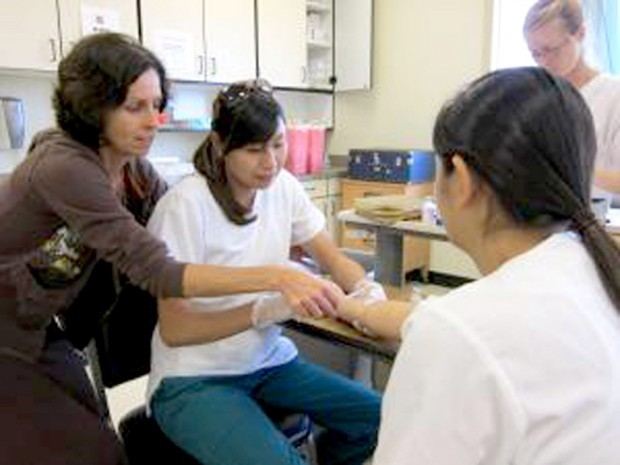HONOLULU — Nursing students on three islands, including Kaua‘i, simultaneously joined around a poi bowl Wednesday evening to celebrate the inauguration of a landmark new course designed to make them even better care givers by teaching them to be sensitive
HONOLULU — Nursing students on three islands, including Kaua‘i, simultaneously joined around a poi bowl Wednesday evening to celebrate the inauguration of a landmark new course designed to make them even better care givers by teaching them to be sensitive to cultural differences that can impact their patients’ health, the University of Hawai‘i reported earlier in the week.
“It’s an opportunity that doesn’t come around very often,” said Dr. Joyce Vogler, the faculty member from UH Manoa School of Nursing and Dental Hygiene. Vogler was the one who developed the course.
“Tonight for the first time, nursing students from the UH Manoa Bachelor of Science in Nursing Program on the islands of Maui, Kaua‘i and O‘ahu will come together to learn skills that haven’t been taught to nurses at this level before,” she said Wednesday.
Vogler said the students participating are senior nursing students, those closest to beginning their careers serving the public.
The new course also represents a partnership between the UH’s medical and nursing schools. Faculty members teaching the course include physicians and PhDs from the John A. Burns School of Medicine, Department of Native Hawaiian Health and faculty from the School of Nursing and Dental Hygiene. JABSOM is the nation’s only accredited medical school with a clinical department dedicated to the care of an indigenous people, Native Hawaiians.
As the class began, a Hawaiian chant, or oli, and a blessing took place before students joined in taking from a communal poi bowl. The students on Maui and Kaua‘i, joining via teleconference, each had a communal poi bowl at their sites. The ceremony began at 6:30 p.m. in UH Manoa’s Webster Hall.
UH’s nursing programs have worked for some time to develop a shared curriculum so that students may graduate with their associate degree and continue seamlessly into their four-year nursing degree without having to relocate to O‘ahu for their upper level courses.
Vogler, who is retiring at the end of the year after more than 22 years at UH Manoa, helped shape the joined curriculum, and she sees the three-island cultural competency course beginning tonight as a dream come true. This course in particular follows up on research and interviews she did with Native Hawaiian patients in which she found many were disillusioned with a lack of cultural sensitivity demonstrated by their providers.
“It’s very important to understand the cultural aspect of health management,” Vogler said. “We want to teach our nurses and allied health care providers to interact appropriately with not only Native Hawaiians, but also Pacific Islanders and Asians when they are caring for these people. That includes giving students information so that when they go into the community, they become culturally sensitive to issues that might be causing detrimental health behaviors, or homelessness, or other situations.”
The class will incorporate the writings and teachings of Native Hawaiian physicians Dr. S. Kalani Brady and Dr. DeeAnn Carpenter; Dr. J. Keawe Kaholokula, PhD, chair of JABSOM’s DNHH; and Dr. Noreen Mokuau, PhD, dean of the Myron B. Thompson School of Social Work. Also participating will be Nalani Minton, director of the I‘ke Au Pono program; Dr. Mary Boland, dean of SONDH; and Dr. Jerris Hedges, dean of JABSOM.


